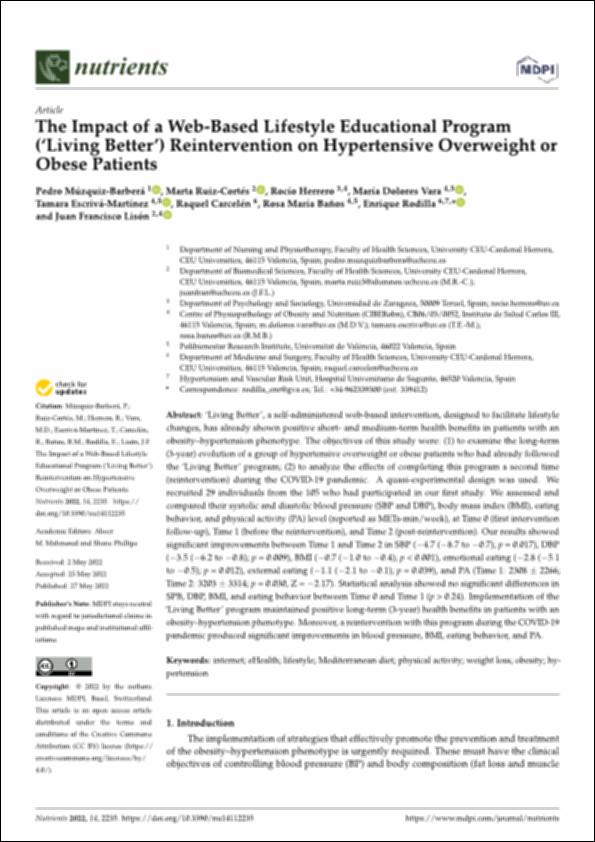Por favor, use este identificador para citar o enlazar este ítem:
http://hdl.handle.net/10637/14241The impact of a web-based lifestyle educational program ('Living better') reintervention on hypertensive overweight or obese patients
| Título : | The impact of a web-based lifestyle educational program ('Living better') reintervention on hypertensive overweight or obese patients |
| Autor : | Múzquiz Barberá, Pedro Ruiz Cortés, Marta Herrero Camarano, Rocío Vara Villodre, María Dolores Escrivá Martínez, Tamara Carcelén González, Raquel Baños Rivera, Rosa María Rodilla Sala, Enrique Lisón Párraga, Juan Francisco |
| Materias: | Ejercicio físico - En línea - Uso terapeútico.; Exercise - Online - Therapeutic use.; Hipertensión - Tratamiento.; Internet in health.; Internet - Aplicaciones en salud.; Obesidad - Tratamiento.; Obesity - Treatment.; Hypertension - Treatment. |
| Editorial : | MDPI |
| Citación : | Múzquiz-Barberá, P., Ruiz-Cortés, M., Herrero, R., Vara, M. D., Escrivá-Martínez, T., Carcelén, R., Baños, R. M., Rodilla, E. & Lisón, J. F. (2022). The impact of a web-based lifestyle educational program ('Living Better') reintervention on hypertensive overweight or obese patients. Nutrients, vol. 14, i. 11 (27 may.), art. 2235. DOI: https://doi.org/10.3390/nu14112235 |
| Resumen : | ‘Living Better’, a self-administered web-based intervention, designed to facilitate lifestyle changes, has already shown positive short- and medium-term health benefits in patients with an obesity–hypertension phenotype. The objectives of this study were: (1) to examine the long-term (3-year) evolution of a group of hypertensive overweight or obese patients who had already followed the ‘Living Better’ program; (2) to analyze the effects of completing this program a second time (reintervention) during the COVID-19 pandemic. A quasi-experimental design was used. We recruited 29 individuals from the 105 who had participated in our first study. We assessed and compared their systolic and diastolic blood pressure (SBP and DBP), body mass index (BMI), eating behavior, and physical activity (PA) level (reported as METs-min/week), at Time 0 (first intervention follow-up), Time 1 (before the reintervention), and Time 2 (post-reintervention). Our results showed significant improvements between Time 1 and Time 2 in SBP (4.7 (8.7 to 0.7); p = 0.017), DBP (3.5 (6.2 to 0.8); p = 0.009), BMI (0.7 (1.0 to 0.4); p < 0.001), emotional eating (2.8 (5.1 to 0.5); p = 0.012), external eating (1.1 (2.1 to 0.1); p = 0.039), and PA (Time 1: 2308 2266; Time 2: 3203 3314; p = 0.030, Z = 2.17). Statistical analysis showed no significant differences in SPB, DBP, BMI, and eating behavior between Time 0 and Time 1 (p > 0.24). Implementation of the ‘Living Better’ program maintained positive long-term (3-year) health benefits in patients with an obesity–hypertension phenotype. Moreover, a reintervention with this program during the COVID-19 pandemic produced significant improvements in blood pressure, BMI, eating behavior, and PA. |
| Descripción : | Este artículo se encuentra disponible en la siguiente URL: https://www.mdpi.com/2072-6643/14/11/2235 Este artículo de investigación pertenece al número especial "Cardiometabolic Health in Relation to Diet and Physical Activity: Experimental and Clinical Evidence". |
| URI : | http://hdl.handle.net/10637/14241 |
| Derechos: | http://creativecommons.org/licenses/by/4.0/deed.es |
| ISSN : | 2072-6643 (Electrónico) |
| Idioma: | es |
| Fecha de publicación : | 27-may-2022 |
| Centro : | Universidad Cardenal Herrera-CEU |
| Aparece en las colecciones: | Dpto. Medicina y Cirugía |
Los ítems de DSpace están protegidos por copyright, con todos los derechos reservados, a menos que se indique lo contrario.


